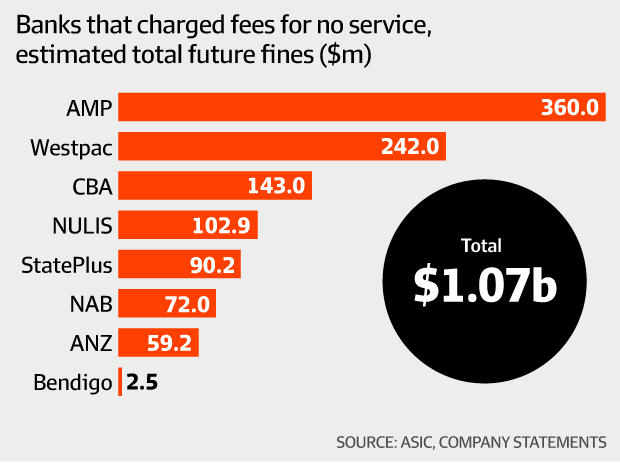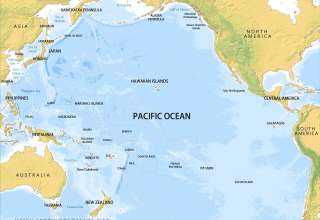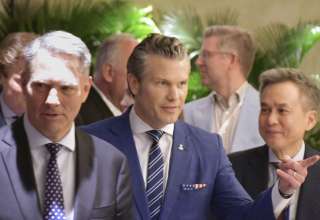The first of a three part series of articles by Humphrey McQueen
A Modest Plea to Commissioner Hayne
Commissioner,
 The more shock-horror headlines tumble out of your investigations into the financial sector, the more we citizens are distraught because our regular consolation is denied us: what’s happened to that One Rotten Apple in the barrel? The best that the system’s defenders have managed is to picture the financial sector as one big rotten apple at the core of an otherwise healthy system of free enterprise.
The more shock-horror headlines tumble out of your investigations into the financial sector, the more we citizens are distraught because our regular consolation is denied us: what’s happened to that One Rotten Apple in the barrel? The best that the system’s defenders have managed is to picture the financial sector as one big rotten apple at the core of an otherwise healthy system of free enterprise.
Adam and Eve tasted the fruit of the Tree of Knowledge and were made to earn their keep by the sweat of their brows. We already carry that penalty. Denied the opioid of the One Rotten Apple, Mr Commissioner, we will be able to tell the Devil Incarnate from his One Rotten Apple. Please, Mr Commissioner, spare us such anguish.
Paris threw Golden Apples before Atalanta in the expectation that she could not resist stooping to pick up the glittering prize and thus allow him to win the race and the greater prize of Helen. The result was the destruction of Troy. Please, Mr Commissioner, spare us that fate. We shall happily trade all the Golden Apples in Christendom for the comfort of One Rotten One.
Please Mr Commissioner, make the Business Council, the Institute of Directors and their kind restore our faith in the essential soundness of capitalism by giving us back their One Rotten Apple.
Your petitioner ever humbly prays,
Humphrey McQueen,
Canberra, 31 January 2019
Terms of reference
The terms of reference for the current Banking Royal Commission are to investigate malpractices in financial institutions.
The institutions under investigation are the Banks and the Superannuation Funds. Neither functions without a battery of other institutions: accountants, actuaries, auditors, rating agencies, lawyers, lobbyists and Business Schools. Furthermore, all those of auxiliaries are directly engaged in Stock Exchanges, Foreign Exchange and Futures markets. Many are global enterprises. In particular, the banks are locked into foreign banks for fund-raising.
An interrogation of malpractices by banks and retail super funds is not even half-way towards unravelling how these institutions operate if their supporting institutions are ignored. Taken together, they are still less than the regime of credit essential for capitalism.
The contrast is not just between an inquiry confined to malpractices by certain financial institutions and one into an entire monetary and banking system. Even the latter would still be a million miles from an inquiry into the whole of the capitalist system. That gap is expressed in the difference between a Royal Commission and a People’s Court.
Only a People’s Court into that entire system would dare to interrogate the prevalence of the malpractices rampant in the financial sector. Meanwhile, in a gesture towards republicanism, these pages will speak of the Malpractices Commission, not a ‘Royal’ one.
[For some overview of what local and imperial bankers have been up to here during the past 200 years:www.surplusvalue.org.au/mcqueen/political_economy/political_economy_bankers.html ]
Kultur
Whenever I hear the term ‘bank Kultur’ I reach for my Mauser.
Whichever PR firm came up with ‘Kultur’ for corporate crime more than earned its million-dollar fee. There’s something ‘civilised’ about having the wrong Kultur. Not like a CFMEU organiser who has to bellow ‘fuck’ in order to get a site made half-way safe.
‘Culture’ also sounds like something we absorb, like the air—polluted though it might be.
We are being sold the line that ‘bank Kultur’ is acquired in the same way we do our native tongue, innocently. In truth, corporate Kultur is learned behaviour. It is inculcated into staff by bonuses and through example. The gouging of super fees by the retail Super funds run by the banks and the AMP is an operational method honed across decades. To ascribe such habitual thieving to some free-floating ‘Kultur’ is to revive belief in phlogiston and the aether.
There is nothing unique to banks about a ‘Kultur’ of crime. It is but one more expression of the needs of capital to expand in order to persist.
If ‘Kultur’ is to blame, a whack of responsibility must be sheeted home to Universities. The Schools of Business that have displaced Faculties of Commerce and Economics retain one shred of virtue: their label is not deceptive. Indeed, they have cooked up a subject branded ‘Business Economics’.
Business Schools also offer courses on ‘Business Ethics’, which is more than a contradiction in terms. Universities train executives in how to get away with it. But should they get sprung, they then enter their pass mark in ‘Ethics’ as a plea bargain.
In a class society, each act of civilisation is fed by a piece of barbarism exacted from workers whose creativity and suffering pay for the benefactor’s generosity. Such is the ‘Kultur’ of capitalism.
Murder is for amateurs. Robbery takes practice.
Crumbs
$700 million has been exacted on the Commonwealth Bank for more than 50,000 instances of facilitating money laundering over three years.
$700 million out of $9 000 million in 2016-2017 profits is about 13 per cent. But the offences went on for three years during which the CBA declared profits of totalling $20 000 million, which works out at closer to 3 per cent.
Had a bikie gang been up to the same, its members would have had all their assets seized.
Had some Muslim facilitated the transfer of funds to Hamas, her house would have been raided and she would have thrown in the slammer for several years after a partly secret trial.
If the legal costs of appearing before the Malpractices Commission, and the PR effort headed by Anna Bligh, are tax deductible as legitimate expenses, why not the $700 million fine? After all, both are incurred in normal course of bank business.
The crummy penalty is not a matter of double-standards but of no standards when it comes to corporate crooks. The proof came when CBA’s share price went up on news of the $700 million fine.
Swindles
 ‘The capitalist class of a given country, taken as a whole, cannot defraud itself.’ Marx, Das Capital.
‘The capitalist class of a given country, taken as a whole, cannot defraud itself.’ Marx, Das Capital.
‘Bankers steal pennies from the eyes of dead men’ is topped by ‘Bank evicts blind pensioner.’ Shock headlines out of the Malpractices Commission deflect attention away from what will never be investigated under the rule of capital: the necessity that the agents of capital have to swindle on top of the everyday exploitation of all labour.
Marx’s critical analysis of political economy can appear contradictory. On the one hand, he shows how exploitation under capitalism is based on an equal exchange between capital and labour. In that case, the sum of wages that we get matches the socially necessary costs of reproducing the timed unit of labour-power we must sell as wage-slaves. Despite this equal exchange, exploitation is part of all such sales and not an exception. Wage-slaves for 7-Eleven would have been exploited even if they had not also been swindled.
Two common errors are: to equate the appropriation of surplus-value with theft—a direct swindle; and to equate swindling with the kind of exploitation that comes out of an equal exchange.
Nonetheless, Capital is flush with instances of swindling— not only of wage-slaves, but also of other capitalists and of both corporate and household customers.[1] The law of equivalents and the law of the jungle do more than co-exist within capitalism. They nourish each other. Marx’s conceptualising of competition between capitals allows us to understand how equal exchange, exploitation and swindling work together.
The first two are primary and inseparable. Without the exploitation from equal exchange there can be no capitalism. Swindling is widespread in any and every class-based system. Its manifestations are contingent, and shaped by shifts in the mode of production.
Within capitalism, the production of surplus-value is grounded on the exploitation from equal exchanges. The realms of circulation provide the field for swindling. Although exploitation and swindling are utterly different, their operations intersect as we see in the labour-capital relation.
On average, wages cover the socially necessary costs of the labour-power that wage-slaves are forced to sell in order to exist. Of course, what is average across a class must vary for its sub-sets. In addition to exploitation, there is wage theft. 7-Eleven underpayments were at the extreme end. But sneakier forms are widespread with cash-in-hand. In addition to clawing back money-wages and entitlements, employers go after unpaid overtime. Here, workers might get the equivalent of the costs of reproducing their labour-power but the rate of their exploitation is driven up by their being forced to work off-the-clock. Piece-rates are a proven way to get that result.
Wage-slaves confront capital as employers but also as the sellers of the goods that we need to reproduce our labour-power. In most cases, the items we need come from capitals other than our own boss.
In some countries, wages are paid in kind at inflated prices, or workers are forced to buy at the company store. In those parts of the world, workers are thereby trapped into debt-peonage at exorbitant rates of interest.
These methods for clawing back wages are exceptional in Australia. What is universal is how social capital sets about to reclaim some of the wages by price-fixing or adulteration.
Until the 1970s, the price of almost every thing we bought was fixed under a policy known as retail-price maintenance. Any retailer who charged her customer less had supplies cut off. Today, the swindles of price-fixing happen far back in the supply chains. Global banks conspire to set benchmark interest rates (LIBOR). AMCOR and VISY fixed the price of cardboard boxes to steal from every Australian— a fraction of a cent each time but enough to scoop up tens of millions of dollars.
Moreover, the agents running the cartels race for the exits when the regulators turn. We have just seen J.P. Morgan roll over to give evidence against its partners, ANZ, Citibank and Deutsche. Not only is there no honour among thieves but, as Marx remarks, honour has its price without having a value.
[1] In the Penguin edition: Volume I: pages 96, 237, 250-1, 254, 264, 266, 907. Volume II: pages 97; 137; 208; 228; 582 584. Volume III: pages 134, 138, 321, 331, 342, 359, 395-6, 407, 422n, 446-9, 488, 551-3, 555, chapter 26, 570-3, 678-9 banks as bandits, 740, 742n, 745, 763, and 966. Theories of Surplus-value, (Moscow), Part III, pp. 91 and 454.Ideological
‘Buy cheap! Sell dear!’ is the il-logic of the agents and personifications of capital. They confuse prices with value and represent both as determined solely by supply and demand. All is subjective: we pay more if the use-value has a higher marginal utility to us. If commodities have no inherent value and if prices are subjective ‘buy cheap and sell dear’ is an open invitation to cheat.
This lop-sided account is a necessary fiction to avoid the reality of capitalist exploitation. If all that happens is that firms outsmart each other in a price war, what makes it possible for an entire economy to grow? Such dealings sufficed when the prevailing mode did not have to expand in order to exist. That was usually the case for ancient slavery and the first serfdoms.
One indisputable fact about capitalism is that its pots of gold, along with its collection of commodities, are more immense than they were two hundred years ago. That explosion cannot have happened by redistributing a pre-existing quantum of wealth. Buying and selling speed that expansion but they could not be its cause. New wealth can come only from the exploitation of labour applied to plundering the riches of nature.
To avoid the facts of wage-slavery and despoliation, capitalism’s academic apologists buzz about the level of commerce. Their significance is why Marx dismisses them as vulgar economists, ‘vulgar’ meaning everyday speech, not ill-mannered. But there are also vulgar Marxians who get agitated about bank malpractices without putting in the hard work needed to understand how a regime of credit is essential to the expanded reproduction of capital.
‘It’s only human nature’
One response to the exposures at the Malpractice Commission is to put the blame on greed as an inescapable fact of life. Stealing is indeed one of the activities of which we human beings are capable. The extent and forms of thievery, however, are not in our genes. What and how much we take are conditioned by the ways in which we live. Pinching an egg from under a goose is a long way from enclosing all the farms on which all the geese depend.
Personifications
We become what we do. That summation of historical materialism applies to us as a species, as a class and as individuals. Its workings inform Costa-Gavras’s 2012 feature film, Capital. A brilliant young socialist from regional France secures his place at the top of a global bank after realising that the only value that his fellow executives respect is the size of his salary package. Not having the time to spend a fraction of his nine million Euros is beside the point: the point is the moral authority that his higher salary gives him over his rivals.
Christina Stead’s A House of All Nations (1938) an eight-hundred page novel set in a private Parisian bank between the wars, does for high (i.e. low) finance what Balzac did for ‘the principle of money’ in post-Napoleonic France. The bank’s director operates on the golden rule: ‘No one ever had enough money.’ He employs only Communists because they have the sharpest understanding of how capitalism works and because they are so embarrassed at working for his bank that they do not steal from him. In the judgement of The Oxford Mate to Australian Literature (1994), House of All Nations is ‘epic in scale, encyclopaedic in detail, cinematic in form …’ Or one could say that Stead’s novel is a fictional companion to volume two of Marx’s Capital.
2006
Although swindling is universal, its sources and forms are subject to time and place. The dirty doings exposed at the Malpractices Commission need to be located in the blowback from the misnamed Global ‘Financial’ Crisis. Since then, low interest rates have coincided with stricter prudential requirements on banks to hold more funds in reserve to ride out the next eruption without getting more tax-funded bail-outs. Those twin pressures squeeze the chances for banks to ‘take’—not ‘make’—profits in their old ways. They can lend less and earn less when they do lend. Therefore, they have turned what had been shonky practices by Dodgy Bros into Standard Operating Procedures at the Big End of Town.




